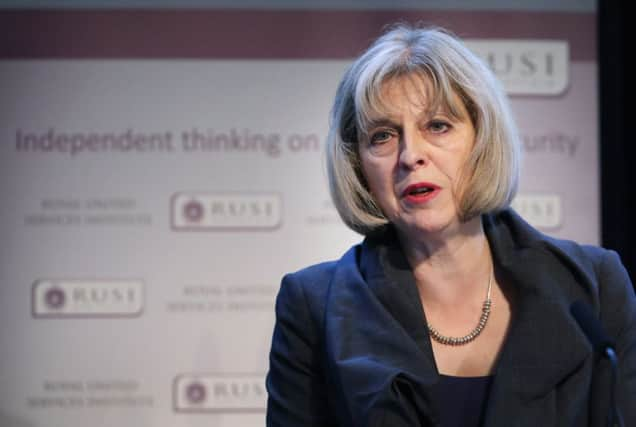Terror attack in UK now ‘highly likely’


The Prime Minister warned the struggle against Islamist extremists in Iraq and Syria poses a greater security risk than al-Qaeda and is likely to last decades.
As the terror threat was raised from substantial to severe, he said legislation would be introduced to flush out those attempting to travel to join the fight in Iraq and Syria. It was also revealed high-profile police patrols would be stepped up. He said legislation would make it easier to seize jihadists’ passports, amid fears Islamist militants could set up a terrorist state on the shores of the Mediterranean.
Advertisement
Hide AdAdvertisement
Hide AdEarlier, Home Secretary Theresa May announced a raising of the terror threat to its second highest level, meaning an attack is highly likely. It is the first time since 2010 that the risk has been rated as severe. In Downing Street yesterday, Mr Cameron said: “What we are facing in Iraq now with Isil [Islamic State] is a greater threat to our security than we have seen before.”
He said the intelligence and security services believed at least 500 Britons had gone to fight in Syria and potentially Iraq.
Experts believe as many as 30 may have travelled from Scotland, including Aberdeen man Abdul Raqib Amin, seen in an IS recruitment video in June.
Mr Cameron stressed the government had already taken steps to counter the threat of jihadists returning to commit atrocities, but said there was still a need to fill “gaps in our armoury”. He will make a full statement to parliament on Monday.
The Afghan Taleban, he said, had harboured and facilitated al-Qaeda terrorism, but IS was effectively a terrorist state.
The group is fighting a brutal insurgency in Iraq and was behind the beheading of American journalist James Foley.
“We could be facing a terrorist state on the shores of the Mediterranean and bordering a Nato member [Turkey],” he added.
The murder of the US photojournalist was “clear evidence – not that any more was needed – that this is not some far-off foreign conflict, thousands of miles away, that we can ignore”.
Advertisement
Hide AdAdvertisement
Hide AdMr Cameron said: “In Afghanistan, the Taleban were prepared to play host to al-Qaeda. With IS, we are facing a terrorist organisation not being hosted in a country but seeking to establish and then violently expand its own terrorist state.
“With designs on expanding to Jordan, Lebanon, right up to the Turkish border, we could be facing a terrorist state on the shores of the Mediterranean and bordering a Nato member.”
His statement came as the Joint Terrorism Analysis Centre (JTAC) raised the threat level from substantial amid fears over British jihadists returning to carry out attacks. But Mrs May said there was no specific intelligence of a forthcoming attack.
“The increase in the threat level is related to developments in Syria and Iraq where terrorist groups are planning attacks against the West,” she said. “Some of those plots are likely to involve foreign fighters who have travelled from the UK and Europe to those conflicts.”
Speculation is mounting that the government could beef up terrorism investigation and prevention measures. They could impose “internal exile” on suspects, similar to the old control orders regime.
Mr Cameron said: “My first priority as prime minister is to make sure we do everything possible to keep our people safe.
“The ambition to create an extremist caliphate in the heart of Iraq and Syria is a threat to our own security here in the UK.
“The terrorist threat was not created by the Iraq war ten years ago. It existed even before the horrific attacks on 9/11, themselves some time before the war.
Advertisement
Hide AdAdvertisement
Hide Ad“This threat cannot be solved simply by dealing with perceived grievances over western foreign policy. Nor can it be dealt with by addressing poverty, dictatorship or instability in the region.
“The root cause of this threat to our security is quite clear. It is a poisonous ideology of Islamist extremism that is condemned by all faiths and faith leaders.”
Mr Cameron is set to push for more co-ordinated European action to track jihadists at a summit in Brussels this weekend.
The UK wants to revive a directive that would enable police and security services across the EU to share passenger records.
National leaders have signed off the arrangements – but they stalled in the European Parliament after MEPs expressed concern about civil liberties.
Earlier this week, Scotland Yard disclosed police activity to combat the threat of returning IS fighters “has been escalating for many months now”.
In the first half of this year, there were 69 arrests relating to Syria. Suspects are being held at a rate fivefold to that in 2013.
Metropolitan Police Commissioner Sir Bernard Hogan-Howe joined calls for would-be jihadis who go to fight abroad to be stripped of their UK passports. He also appealed for the return of control orders to restrict the movement of suspects who could not face trial or be deported.
Advertisement
Hide AdAdvertisement
Hide AdHe said Scotland Yard is prepared in case a swathe of homegrown extremists decide to return at the same time.
In June, Richard Barrett, a former head of counter-terrorism at MI6, estimated that up to 300 people may have returned to the UK already. He said intelligence services faced an “impossible” task in trying to track them.
Raffaello Pantucci, senior research fellow at think-tank the Royal United Services Institute, said: “There is potential for hundreds of people with knowledge of the battlefield to come back. It all speaks to a very dangerous confluence of events.
“The threat picture is very menacing.”